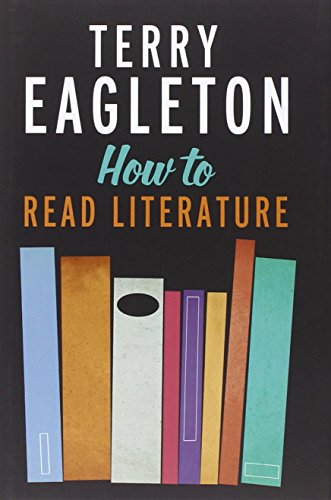
Synopsis
What makes a work of literature good or bad? How freely can the reader interpret it? Could a nursery rhyme like Baa Baa Black Sheep be full of concealed loathing, resentment, and aggression? In this accessible, delightfully entertaining book, Terry Eagleton addresses these intriguing questions and a host of others. How to Read Literature is the book of choice for students new to the study of literature and for all other readers interested in deepening their understanding and enriching their reading experience.
In a series of brilliant analyses, Eagleton shows how to read with due attention to tone, rhythm, texture, syntax, allusion, ambiguity, and other formal aspects of literary works. He also examines broader questions of character, plot, narrative, the creative imagination, the meaning of fictionality, and the tension between what works of literature say and what they show. Unfailingly authoritative and cheerfully opinionated, the author provides useful commentaries on classicism, Romanticism, modernism, and postmodernism along with spellbinding insights into a huge range of authors, from Shakespeare and J. K. Rowling to Jane Austen and Samuel Beckett.
"synopsis" may belong to another edition of this title.
About the Author
Reviews
In this serious but breezy and idiosyncratic take on how to read and enjoy literature, English critic Eagleton performs an important if basic service, distinguishing the way people talk about fiction, drama, or poetry from the way we discuss real life. His emphasis is on form—how literature works—rather than content. The book’s chapter headings—Openings, Character, Narrative, Interpretation, and Value—summarize, but do not do justice to, his sophisticated approach. Eagleton’s erudition is supplemented with entertaining if occasionally over-the-top wit, most notably in his close textual analysis of Baa Baa Black Sheep and in his conclusion regarding the quality of literature, invoking the atrocious Scottish poet William McGonagall. His literary examples are well chosen and largely canonical—including Shakespeare, Dickens, and Austen (but also the Harry Potter series)—and are predominantly, although not exclusively, British. Eagleton does not elucidate how he expects his audience, which presumably doesn’t yet know how to read literature, to be familiar with these, or any, authors. More seriously, though, his book should appeal to readers of James Wood’s more traditional How Fiction Works (2008). --Mark Levine
"About this title" may belong to another edition of this title.
Other Popular Editions of the Same Title
Search results for How to Read Literature
How to Read Literature
Seller: World of Books (was SecondSale), Montgomery, IL, U.S.A.
Condition: Good. Item in good condition. Textbooks may not include supplemental items i.e. CDs, access codes etc. Seller Inventory # 00094183972
How to Read Literature
Seller: Goodwill of Colorado, COLORADO SPRINGS, CO, U.S.A.
Condition: good. All pages and cover are intact. Dust jacket included if applicable, though it may be missing on hardcover editions. Spine and cover may show minor signs of wear including scuff marks, curls or bends to corners as well as cosmetic blemishes including stickers. Pages may contain limited notes or highlighting. "From the library of" labels may be present. Shrink wrap, dust covers, or boxed set packaging may be missing. Bundled media e.g., CDs, DVDs, access codes may not be included. Seller Inventory # COLV.0300190964.G
How to Read Literature
Seller: Wonder Book, Frederick, MD, U.S.A.
Condition: Good. Good condition. Very Good dust jacket. A copy that has been read but remains intact. May contain markings such as bookplates, stamps, limited notes and highlighting, or a few light stains. Seller Inventory # G04K-01245
How to Read Literature
Seller: ThriftBooks-Dallas, Dallas, TX, U.S.A.
Hardcover. Condition: Very Good. No Jacket. Former library book; May have limited writing in cover pages. Pages are unmarked. ~ ThriftBooks: Read More, Spend Less. Seller Inventory # G0300190964I4N10
How to Read Literature
Seller: Better World Books: West, Reno, NV, U.S.A.
Condition: Good. Former library book; may include library markings. Used book that is in clean, average condition without any missing pages. Seller Inventory # 4400656-6
How to Read Literature
Seller: Better World Books, Mishawaka, IN, U.S.A.
Condition: Good. Former library book; may include library markings. Used book that is in clean, average condition without any missing pages. Seller Inventory # 4400656-6
How to Read Literature
Seller: Midtown Scholar Bookstore, Harrisburg, PA, U.S.A.
Hardcover. Condition: Good. HARDCOVER Good - Bumped and creased book with tears to the extremities, but not affecting the text block, may have remainder mark or previous owner's name - GOOD Standard-sized. Seller Inventory # M0300190964Z3
How to Read Literature
Seller: HPB Inc., Dallas, TX, U.S.A.
Hardcover. Condition: Very Good. Connecting readers with great books since 1972! Used books may not include companion materials, and may have some shelf wear or limited writing. We ship orders daily and Customer Service is our top priority! Seller Inventory # S_416754675
How to Read Literature
Seller: WeBuyBooks, Rossendale, LANCS, United Kingdom
Condition: Good. Most items will be dispatched the same or the next working day. A copy that has been read but remains in clean condition. All of the pages are intact and the cover is intact and the spine may show signs of wear. The book may have minor markings which are not specifically mentioned. Seller Inventory # wbs9506197124
Buy Used
Quantity: 1 available
How to Read Literature
Seller: WorldofBooks, Goring-By-Sea, WS, United Kingdom
Paperback. Condition: Very Good. The book has been read, but is in excellent condition. Pages are intact and not marred by notes or highlighting. The spine remains undamaged. Seller Inventory # GOR006650958
Buy Used
Quantity: 3 available

